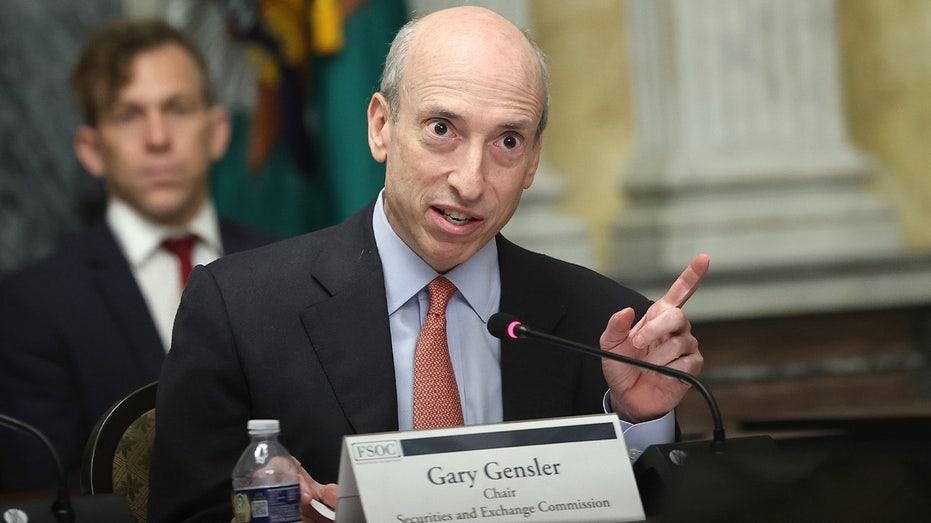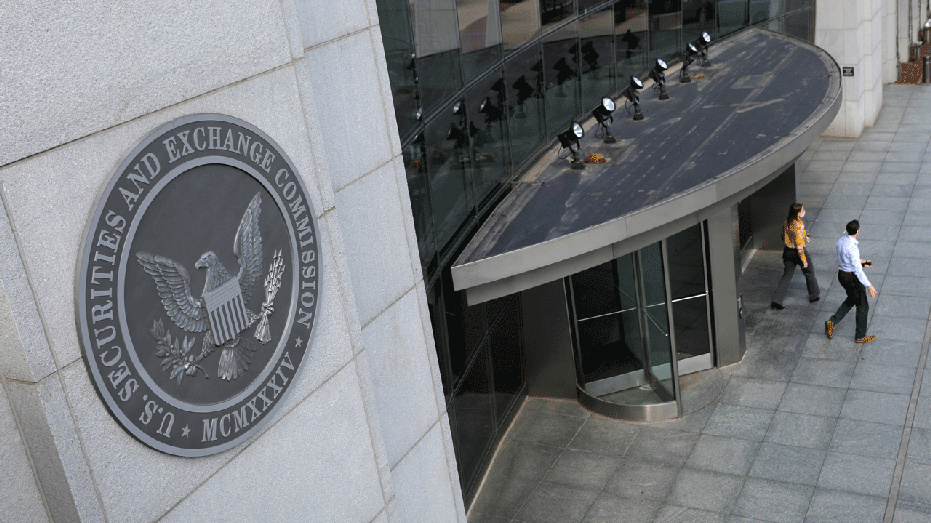SEC could make crypto history in new year with first spot bitcoin ETF approval
Check out what’s clicking on FoxBusiness.com
Big money management firms are growing increasingly confident that the Securities and Exchange Commission will make crypto history in early January by approving the first “spot” bitcoin exchange-traded fund, FOX Business has learned.
Sources close to these firms say recent guidance from SEC officials is that a green light will likely come by Jan. 10, 2024. This is the final deadline for the SEC to approve or deny an application from the first firm to ask for the SEC’s blessing for a spot bitcoin ETF: Cathie Wood’s Ark Investment Management in partnership with 21Shares.
All told, about a dozen companies, including Wall Street asset-management titans like BlackRock and Fidelity, have applied for a spot bitcoin ETF, or one that is valued off the real-time price of the digital asset.
VALKYRIE INVESTMENTS FIRST TO OFFER ETHER FUTURES THROUGH ETF
People at these firms believe the SEC could approve several applications at once. An SEC spokesman had no comment.
If approval does come, as many expect, it will mark a major step toward the mainstream adoption of cryptocurrency in the U.S., something that Wall Street’s top cop, SEC Chairman Gary Gensler, has been reluctant to endorse until recently when the U.S. Court of Appeals for the D.C. Circuit issued a ruling that scaled back his authority in regulating crypto.

SEC Chairman Gary Gensler participates in a meeting of the Financial Stability Oversight Council at the U.S. Treasury on July 28, 2023, in Washington, D.C. (Kevin Dietsch / Getty Images)
A spot bitcoin ETF would give retail investors greater exposure to the world’s largest cryptocurrency at less cost than the already approved bitcoin ETF priced off the futures market. Moreover, investors can get exposure to bitcoin and avoid going to an unregulated exchange by purchasing an ETF through highly regulated money management firms while trading occurs on the New York Stock Exchange and Nasdaq stock market.
One downside for investors includes an unusual demand from the SEC in the way the ETFs are structured. In meetings with the big money management firms, the SEC is insisting that applicants use cash to buy shares of the ETF, and cannot use the underlying asset, which in this case is bitcoin.
RAMASWAMY WOOS PRO-CRYPTO VOTERS, SAYS HE’LL BUILD NEW POLICY FRAMEWORK FOR DIGITAL ASSETS
Conventional ETFs allow so-called “in-kind” transactions – which means market makers would be allowed to exchange bitcoin for ETF shares. The “cash create” route means ETF issuers will have to exchange bitcoin for cash on every transaction – a longer and more complicated process that requires the issuers themselves to buy the bitcoin, not the broker-dealers.
Securities lawyers say another disadvantage of cash creation is that investors would be robbed of an important tax advantage; “in kind” purchases are not a taxable event, but selling Bitcoin for cash before the ETF purchase would be.
Several spot bitcoin ETF applicants such as Grayscale are hesitant to give up the fight for in-kind creations. In a meeting with the SEC on Tuesday, Grayscale told the agency it believes offering both in-kind and cash creations and redemptions are in the best interest of investors because it supports “a deeper, more robust primary market, resulting in a more efficient ETP market structure.”
Cash creation essentially shifts the burden of trading bitcoin from professional trading firms to the authorized participants (APs) such as Morgan Stanley and Goldman Sachs,” said Dave Weisberger, CoinRoutes co-CEO. “This means less competition between issuers and performance will be based on which issuer has the better resources and trading strategy.”
Weisberger says the SEC is insisting on cash redemption over in-kind because the agency doesn’t currently allow broker-dealers such as Robinhood and Fidelity to trade spot bitcoin directly.
It is not immediately clear why the agency continues to block brokers from trading spot bitcoin, but Weisberger believes it has a lot to do with the political tension around digital assets from members of Congress. One explanation from people meeting with the SEC is that the commission is worried about the use of bitcoin for money laundering, market manipulation and other illegal purposes.

People exit the headquarters of the U.S. Securities and Exchange Commission in Washington, D.C., on May 12, 2021. (Andrew Kelly / Reuters)
One former SEC official blames it on Gensler’s general dislike of digital assets, thus he’s looking to put a “drag” on the new crypto product. Gensler still has not provided total clarity about bitcoin’s actual status, whether it’s a lightly regulated commodity or a security like a stock or bond that demands the commission’s full regulatory attention. Ditto for the second-most popular crypto, ethereum. In the past, Gensler has said that most other digital coins are considered securities, though while SEC chair he’s remained mum on the matter.
The world’s biggest money manager, BlackRock, with $9 trillion in assets under management, has made receiving SEC approval for its proposed bitcoin ETF a key corporate priority, FOX Business has learned. Larry Fink, BlackRock’s founder and CEO, has referred to bitcoin as “an international asset” and a “store of value” rivaling the long-held status of gold.
BlackRock, which has more than 400 traditional ETFs on the market, has met with the SEC five times regarding its spot bitcoin ETF application, the most recent of which occurred on Tuesday. SEC staffers have held around 24 meetings with various ETF hopefuls, signaling to the industry that the agency is doubling down to get these ETFs to market in the new year.
GET FOX BUSINESS ON THE GO BY CLICKING HERE
Of course, the SEC could deny all the applications, but industry officials are giving it low odds. The reason: In August, the D.C. Court of Appeals vacated the SEC’s denial of crypto asset manager Grayscale’s application to convert its GBTC Trust into a spot bitcoin ETF. The three-judge panel went on to call the SEC’s actions “arbitrary and capricious.”
The ruling is seen as a significant precedent that money managers seeking the spot bitcoin ETF will rely on if the SEC rebuffs their applications.